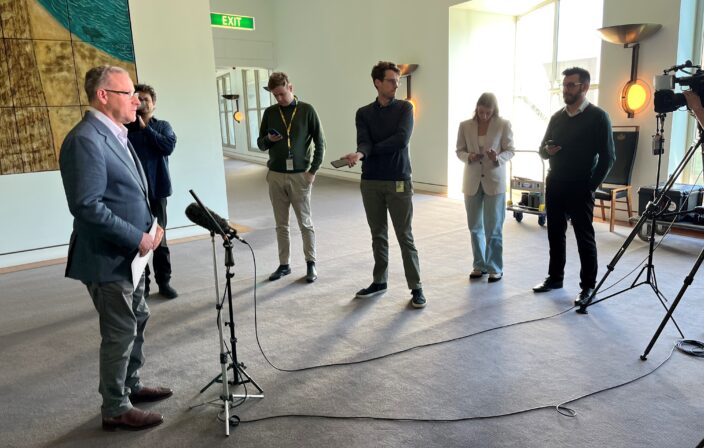ACCI responds to media reports into CFMEU
15 Jul 2024
|Transcripts
Event: ACCI chief executive officer Andrew McKellar press conference at Parliament House, Canberra
Date: Monday 15 July 2024
Topics: CFMEU; US political situation
E&OE
Andrew McKellar:
Clearly there are very, very serious allegations that have been raised. Investigations by the media agencies raise fundamental questions. I think it’s well established that the CFMEU over a long period of time has consistently shown an inclination to operate outside of the rules of the industrial relations system. And there are a number of court cases, legal actions, which have demonstrated that the allegations of criminal connections and impropriety. These are very serious. They raise the concerns to a new level, and we are calling on the federal government to take decisive action here. We think that at a minimum, an independent high level judicial inquiry is warranted with all of the powers of a Royal Commission.
We can’t stand idly by and see such significant concerns being swept under the carpet. There are major issues for state governments. There are major issues in the building and construction industry, which can’t be ignored. I think what the recent allegations show is that the abolition of the ABCC was a terrible mistake. That longstanding behavior of the CFMEU ignoring the rules, the operation of law and practice in the industrial relations system, demonstrates that they can only be held to account if there’s a powerful, well-resourced independent regulator that can bring them to book and hold them into account as often as possible. Beyond that, the criminal allegations are very serious, and they need proper investigation.
Journalist:
You raised the possibility of these allegations being swept under the carpet. They’re your words. Did you have a real fear that they might be swept under the carpet and what would that look like?
Andrew McKellar:
We’ve seen a very muted response, I think, over the past day or so as these allegations that result of the investigation that have been conducted by media agencies has come to light. We’ve seen a very muted response from state governments, from Victoria and Queensland in particular. So, I think that points to the fact that we haven’t yet seen any evidence that those governments are taking these accusations, these allegations seriously. They need to do so in those circumstances. It’s really up to the federal government to ensure that there’s public confidence and that these allegations of criminality are properly tested.
Journalist:
It sounds like you don’t have confidence in any of those governments to do what needs to be done, fair comment or not?
Andrew McKellar:
I think so far, the reaction of some governments at the state level in particular has been puzzling. It’s been very muted. We’ve seen more evidence from the federal government expressing concern, but simply deregistering the union, simply having the national office of the CFMEU come in and take over the administration of the state division in Victoria, that’s not adequate. It needs to, public confidence needs to be restored. The only way you can do that is to have a high-level judicial inquiry with all of the powers of a Royal commission.
Journalist:
How concerning is that muted response from the states?
Andrew McKellar:
It’s very puzzling. These are serious allegations. They need a strong response. So, we do expect that governments should come back with a coordinated response that demonstrates that they are protecting the public interest. I mean, let’s not lose sight of the fact that some of these allegations go to the fact that there are taxpayer funds involved, public construction contracts that are involved. So clearly those issues need to be investigated. That’s why we say the federal government needs to step in, needs to take control of this issue, needs to set up a process to really address the stench that is emerging on these serious allegations.
Journalist:
On another front, if I might, Australian business has a critical interest in the health of the American economy and democracy, frankly. What concerns do you have representing Australian business, seeing the events of yesterday and what might unfold over the next few months?
Andrew McKellar:
Obviously, there are huge concerns. There’s a lot at stake in the forthcoming election in the United States. That’s absolutely true. I mean, the United States is the number one source of inward investment in Australia. They’re a major trading and economic partner, a major strategic partner. So, our futures are very much bound up with a strong United States, which adheres to the democratic values. So yesterday, of course, was a great concern. What was seen, I think the response of the Australian government was entirely appropriate on both sides of politics, and I think our political leaders spoke very well for the Australian community, including the business community.
Journalist:
What are the dangers for business in the months ahead for Australian business looking in the United States?
Andrew McKellar:
There’s obviously a lot bound up in the future of the US economy. It’s a major driver of the global economic cycle. So, ensuring that there is confidence, a strong approach to economic policy there, that’s going to be vital in terms of who forms the next administration.
Journalist:
One more question on that, if I might. I mean to most onlookers, Trump and Biden are very different candidates with a very different, certainly foreign policies and approach to trade. They’re two critical differences. What’s the view of Australian business on which administration better suit business interest in this country because they’re very different?
Andrew McKellar:
The business community understands that the US process is one of the most democratic in the world. So it’s up to the American people to determine the government, the administration that they elect, and obviously the business community will look to work effectively with whoever forms the next administration in the us. That’s a matter entirely for the democratic process of the American people.
Journalist:
Just back on the national executive taking power from the Victorian branch, do you hold any hope that that will lead to many changes?
Andrew McKellar:
Not at all. I mean, I think that’s a smokescreen, to be honest. It gives us no confidence. So, whether or not the CFMEU is being operated by the national branch, whether or not there’s a move to deregister, the CFMEU, I don’t think either of those moves have given us any level of confidence that that will address the fundamental issues we’ve seen in the past over decades. In fact, the CFMEU and its predecessors, in fact, if you go back to the time the old BLF, which was deregistered, it didn’t change the culture. The only way to address that is to have a strong effective regulator like the ABCC, which is well-resourced, which can hold these people, these organizations to account when they step outside the law. Beyond that, the issues of criminality are also much more serious, and they need a strong response as well. It doesn’t provide a long-term solution. It may well be necessary in this case, but it doesn’t give us confidence that there’s a long-term solution in the building and construction sector.


